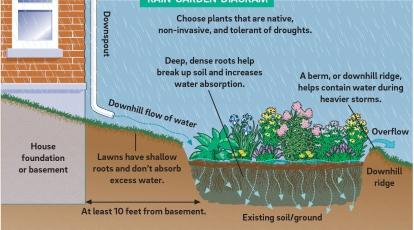
4 minute read
Stormwater Management
Introducing Easttown's Municipal Separate Storm Sewer System(MS4)
First: an environmentalist's idealistic and public-spirited admonition: Easttown Township, together with its residents, is an environmental steward for our own landscape. However, situated within the uplands of the Darby Creek and Crum Creek watersheds environs, theTownship also has a role and responsibility in our downstream neighbors', Delaware Bay's and ultimately the Atlantic Ocean's water quality. Yet another aspect: Under Easttown's streets, along with water supply and sanitary sewer pipes, a separate municipal stormwater system is present. Its 100+ culverts collect rain and melted snow and ice into sub-surface pipes that drain to our streams. This run-off water carries sediments from erosion and litter.
Advertisement
The preceding introduction's arguably lofty language qualitatively summarizes Easttown's administrative and quantitative local implementation requirements under the Commonwealth's MS4 program. (Municipal Separate Stormwater System). MS4 is a highly detailed and challenging federal mandate originating in the US Environmental Protection Agency. In Pennsylvania MS4 is overseen by the State Department of Environmental Protection, which in turn imposes requirements on municipalities.
As a result, Easttown's stormwater system now operates subject to a "National Pollution Discharge Elimination System" (NPDES) permit that expires, subject to renewal, on June 30, 2025. Easttown's permit requires annual reporting; intended to show compliance with the permit requirements. One of those requirements is a demonstrated ten percent sediment load reduction for stormwater collected in the system. Other requirements involve mapping, documenting, and reporting upon existing conditions as well as achieving public participation in the process. In effect, for Easttown and its residents, MS4 converts our ethical responsibility, as upstream watershed occupants, to downstream locales into a legal requirement.
Easttown Township now has a Stormwater Management Advisory Committee with specific advisory responsibility for the Township's stormwater management concerns.
Easttown's Environmental Advisory Council, formed in 2021, has undertaken several initiatives that, although not specifically intended to fulfill the Township's MS4 obligations, have compatible and overlapping goals. These include recent as well as planned seminars on rain gardens, waste plastic, and local watersheds, as well as successfully having proposed an updating to our open space, recreational, and environmental plan. This project is now underway, via a planning consultant, Thomas Comitta Associates, with guidance from a Board of Supervisors appointed task force.
In order to assist with MS4 compliance, volunteers willing to assist the Township may be asked to observe and document existing conditions with our Township's many outfalls (a.k.a. locations at which the Township's storm system connects to the stream network). Residents also can take steps on their own properties that will help accomplish the MS4 goal. Installing a rain garden is one example. Another is allowing excess lawn area to revert to meadowland. The Darby Creek Valley Association can be a resource for residents by conducting individual property stormwater audits via its Stream Smartprogram. Similarly, the Township is in the process of working with property owners to voluntarily install sediment control projects on their properties.
Rain Gardens
Rain gardens are shallow, planted depressions that are designed to absorb water from your roof, allowing it to drain directly into the soil. Typically, a downspout from your home is diverted toward the rain garden. This can prevent hundreds of gallons per year from entering the stormwater system. Rain gardens are one of the most cost effective ways to manage stormwater runoff and can be a beautiful addition to your existing landscape design. Rain Gardens Tips
Check your soil first! Rain gardens require well-draining soil. Rain gardens must be planted at least 10 feet from any below-ground basement. Rain gardens can be designed to suit your landscaping preferences by using a variety of native, perennial plant species. This is not a vegetable or herb garden. Rain gardens are designed to absorb stormwater and filter out pollutants—not for growing food.
Philadelphia Water HSH v 1.0
As part of implementing its 2018 Comprehensive Plan, Easttown has taken the initial steps in an ambitious effort to update its 1993 dated Recreation, Open Space, and Environmental Resources Plan. The Board of Supervisors has retained Thomas Comitta Associates, Inc. to undertake the draft plan development and has appointed a Task Force to oversee and guide the process. Task Force members are: Emily Spring and Kevin Marks, representing the Township's citizenry overall, Michael Wacey, (Board of Supervisors), Lisa Schwarcz (Parks and Recreation Board), Ann Rothmann, (Planning Commission), and Gary Ellis (Environmental Advisory Council). Colleen Gray, Eastown's
thDirector of Planning and Zoning, is providing staff support. The group held its first meeting on August 17 and selected Gary Ellis and Emily Spring as Chairperson and Vice-chair, respectively. Please check the website calendar for upcoming meetings. This is an important Township initiative, intended to foster significant, positive long term consequences. As with all Easttown boards, commissions, and councils, these meetings are open to the public and Township residents are urged to participate.




